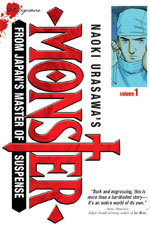 By Naoki Urasawa
By Naoki Urasawa
224 pages, black and white
Published by Viz
Everyone knows the old theoretical philosophical question by now. “If you could travel back and time and kill Adolf Hitler as a child, would you?” I wouldn’t be surprised if that’s exactly what inspired Naoki Urasawa’s Monster. The one big difference? I think Monster‘s twist on that old chestnut is the far more interesting scenario.
It’s 1986, and Doctor Kenzo Tenma is one of the top surgeons at Eisler Memorial Hospital in Düsseldorf, West Germany. Tenma has it all; a beautiful fiancee, a great job, and is truly a rising star in his profession. Then when Tenma discovers that the hospital is using a priority system based on the patient’s social status, he rebels and operates on a young boy who needs his skills much more than a famous politician, and Tenma’s life falls apart. Reduced to a pariah and unable to escape, Tenma will have to live with knowing that he made the morally right choice to put him in such a bad position. But then one night everything changes yet again. Has karma rewarded Tenma for making the right decision earlier? Or was it something far more sinister?
Urasawa’s Monster starts off at a slow pace, giving you a real feel for Tenma’s life before his morals got the best of him, and showing you just what he gave up in order to do the “right thing.” As Tenma’s career goes from high to low to high again through the course of the first volume of Monster, we see a man transformed from someone high on life to being run down into the dirt. We see how horrible Tenma’s personal life becomes when he’s punished for helping the patient who needed his skills more, and how the only consolation is that he was able to save a little boy from a wound that would have otherwise been fatal. When Tenma’s life turns around, to the reader it’s obvious as to what’s happened even as the characters fail to comprehend its significance, and it brings up the first part of the great moral debate of Monster. Is it right for Tenma’s life to get better again because a monstrous killer has begun to slay again?
This, of course, is really just the edge of the “reverse Hitler” question that Monster poses. Instead of having the opportunity to kill a genocidal maniac as a child, Tenma was unknowingly given the chance to save a savage killer and did so. Does this make Tenma responsible for the deaths that will ensue? And what will it do to Tenma? It’s actually a little frustrating that considering it’s one of the central themes of the series that these are questions that really only get asked in the final pages of the first volume; what we have here is over 200 pages of setup. It’s admittedly a very elegant and thorough setup, letting us really get to know Tenma and care about him, but when you consider that the back cover of the book in many ways tells the entire plot in a five sentence blurb, there really isn’t a lot of story here just yet. It’s very much to Urasawa’s credit that even knowing what’s going to happen in this first volume of Monster that it’s still as enthralling as it is.
I’d never seen Urasawa’s art before but I’m very impressed with it. In some ways it reminds me a bit of a softer, gentler version of the art of Ryoichi Ikegami (Sanctuary, Crying Freeman). Tenma looks like a very average man under Urasawa’s pen; not a dashing hero or charismatic mastermind, but just someone you’d see passing by on the street. It’s a smart move, making Tenma someone very easy to empathize with, letting the reader ask themselves what they’d have done in the same sort of situation. The rest of the characters are equally average looking or less, like Inspector Lunge with his snake-like face and his keenly perceptive eyes. It’s not until we finally see the monstrous killer at the end of the book that it becomes clear that this is all very deliberate; all the good looks and charm were saved for him, the horrendous villain of the story. It’s one more little twist in the nightmarish world for Tenma that is Monster.
Monster is an immensely creepy book, with more horror than any sort of zombie or bug-eyed monster story I’ve read in a long time. It’s a little bit frustrating if you know absolutely anything about the series, because it feels at times like it’s moving incredibly slow (especially when compared to the rapid pace of a series like Death Note). There’s no denying that the book is still pretty enthralling, though, thanks to the very careful and deliberate setup for the rest of the series. The big question is now where Monster goes from here; Urasawa’s setup makes me want to definitely find out.
Purchase Links:
